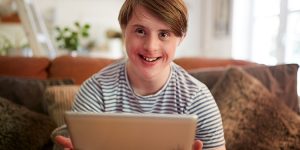Communication: Special Factor Considerations
Let us know about your experience on our site. Use the link below to submit your thoughts.
 Communication is all the different ways in which a learner understands and communicates. Language development supports many other aspects of development including literacy, social, and cognitive development. In this special factor IEP teams should consider how the learner communicates throughout the school day, during instructional routines and embedded opportunities throughout their day.
Communication is all the different ways in which a learner understands and communicates. Language development supports many other aspects of development including literacy, social, and cognitive development. In this special factor IEP teams should consider how the learner communicates throughout the school day, during instructional routines and embedded opportunities throughout their day.
Does the learner’s communication or language skills interfere with their education?
- Use a text reader
- Participate in reading instruction with accommodations
- Independently read content
If access is a concern then the team should consider ASSISTIVE TECHNOLOGY as an additional Special Factor. If the learner is not making progress due to comprehension difficulties and has had access to the content, then the team may consider COMMUNICATION as a Special Factor. Within the special factor of Communication a learner’s expressive language skills are also considered. Data regarding the learner’s academic interactions with peers and adults could be reviewed. In addition, the IEP team could review information related to the learner’s oral and written communication, such as:
- Appropriate form (is it understandable and grammatically correct?),
- Appropriate content, and
- Appropriate use in social and academic contexts.
Does the learner’s communication interfere with participation in social and extracurricular interactions?
- initiating conversation,
- responding on topic,
- maintaining conversation, or
- answering a question that was asked. This may be due to the learner’s limited verbal skills or the vocabulary not being available on one’s communication device/system.
If the learner is not able to participate and engage in reciprocal social interactions with peers and adults, communication may be a special factor that is incorporated into the plan.
Does the learner’s mode of communication impact their academic progress?
If the IEP team answers NO to all questions, then the consideration process would stop. COMMUNICATION would NOT be a special factor. If the IEP team would answer YES to any of the considerations above, then the IEP team should identify COMMUNICATION as a special factor. When Communication is a special factor to be addressed throughout the IEP, consideration should be given to how the learner communicates during routines and embedded opportunities throughout their day, and how all team members can impact progress related to the Iowa Academic Standards related to communication.
Additional Resources
Further resources are available on the i3 special education resources page.